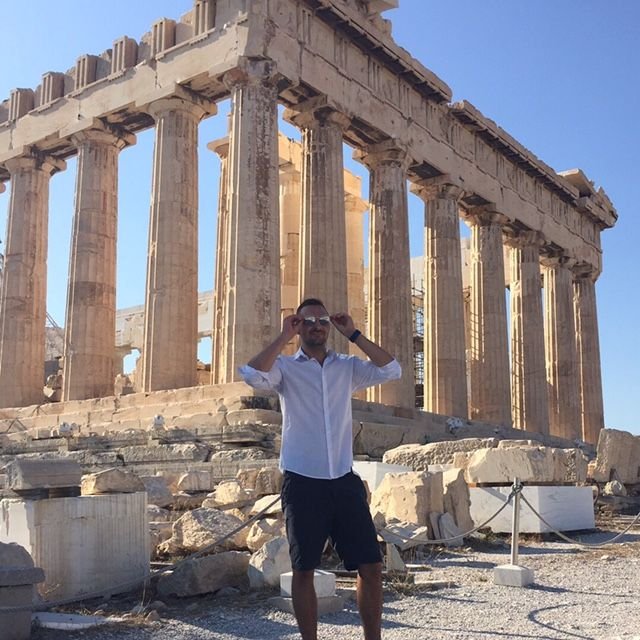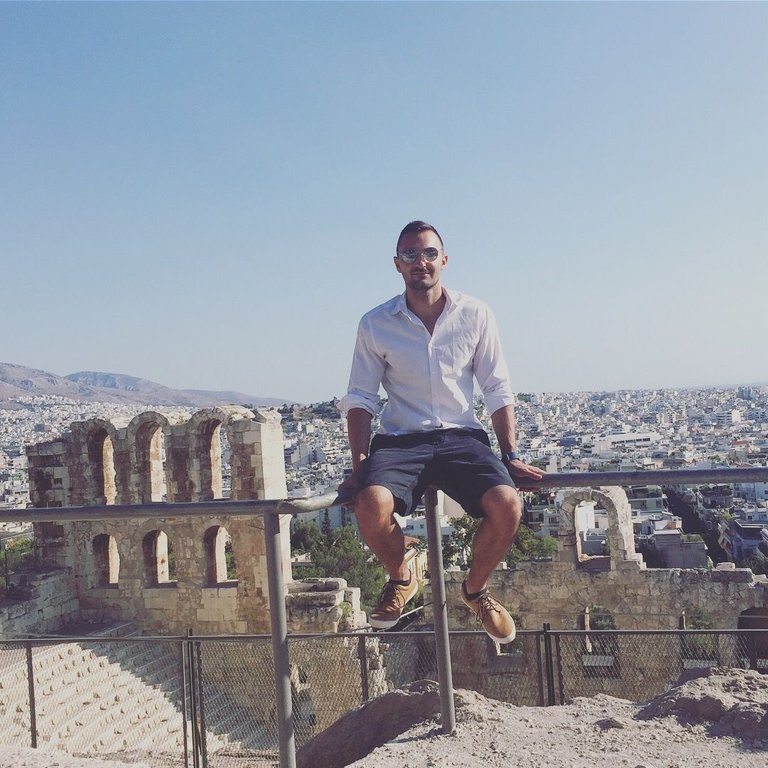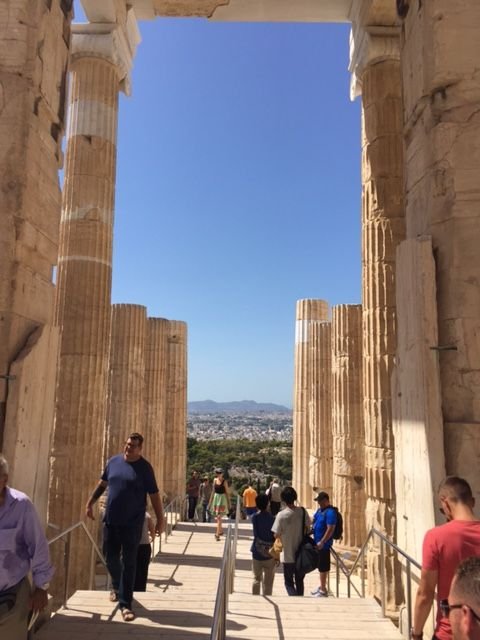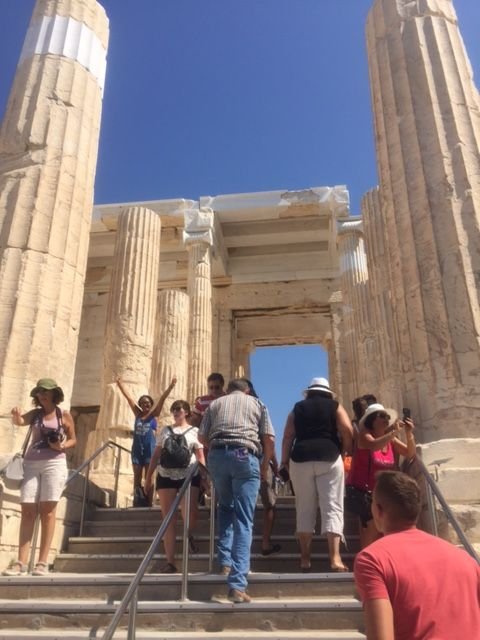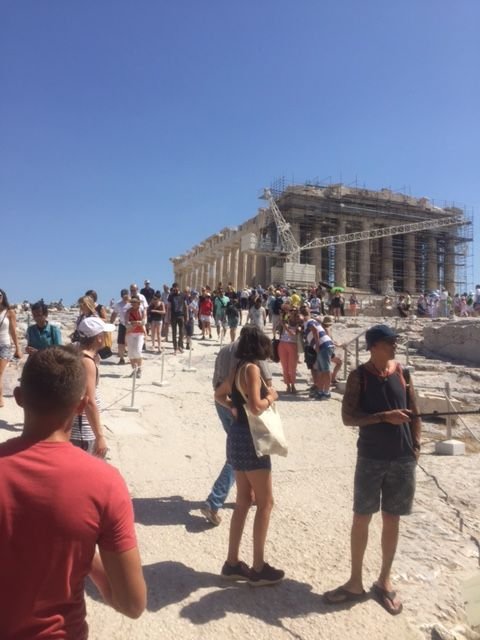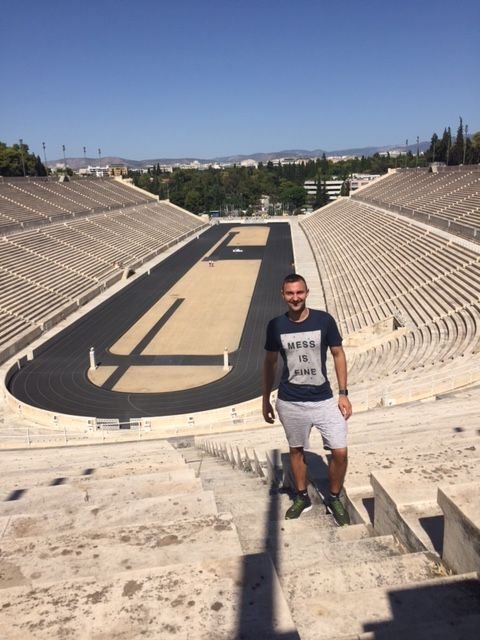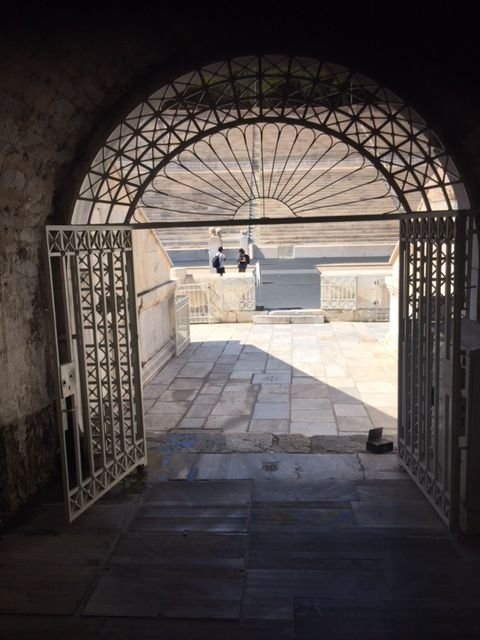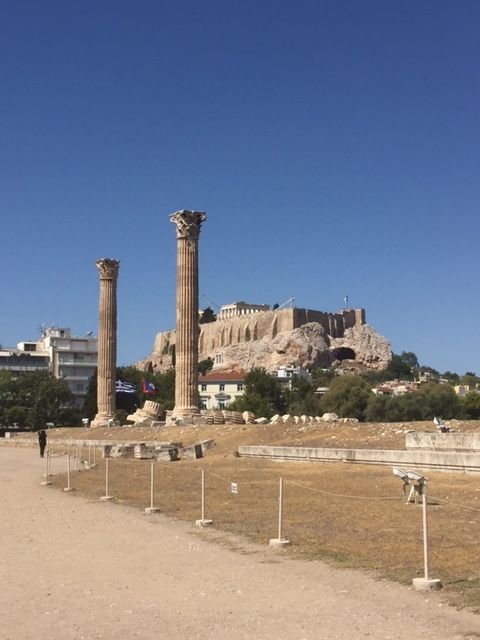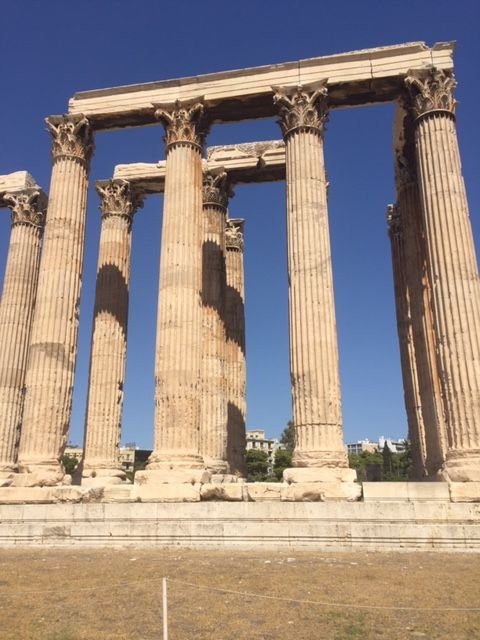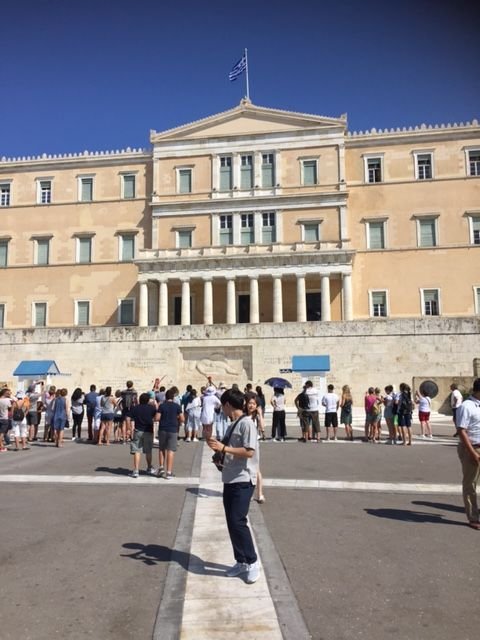1. Acropolis
The Greek civilization is one of the oldest and biggest in Europe, stretching back more than 3000 years. There are many old monuments you will come across on your visit to Athens; however, the most recognizable monument is Acropolis. A hill in the center of the city, with unbelievable history is a home of the most recognized monument in the city, Acropolis. It’s very hard to even think how old Greeks managed to build this amazing building. During the summer it gets very crowded, which makes it harder to get around, but absolutely worth 30 euros and 20 minutes climbing.
Parthenon
View on the Athens as a background
The Parthenon and other main buildings on the Acropolis were built by Pericles in the 5th century BC as a monument to the cultural and political achievements of the inhabitants of Athens. The term acropolis means upper city and many of the city states of ancient Greece are built around an acropolis where the inhabitants can go as a place of refuge in times of invasion. It's for this reason that the most sacred buildings are usually on the acropolis. It's the safest most secure place in town. As little as 150 years ago there were still dwellings on the Acropolis of Athens. Those of you who have read Aristophanes will recall that in Lysistrata the women have Athens barricaded themselves in the fortress in protest, being tired of their men going to war against Sparta. Depriving them of sex, cooking and care it was a terrific strategy that might even work today. Regardless, the play opened the door to the subject of sexual frustration in comedy and without it we might not have Woody Allen. Now days there are still protests which occasionally take place by site employees closing the Acropolis to tourists, some of whom have waited a lifetime to come to Greece. Thankfully these are rare and of short duration.
Climbing up to Parthenon
The best time to climb on Acropolis is is the late winter or spring when even this stone mountain is not immune to the proliferation of grass and wildflowers which seem to burst from every crack. Even in December, January and February the Acropolis can be surprisingly green. The benefits of visiting during the winter time is the price which are 20% cheaper. Even having seen a thousand photographs one is still not prepared for the immensity of the Parthenon. The building was designed by the architects Kallikrates and Iktinos as the home of the giant statue of Athena. It took 9 years to build and was completed in 438 BC and is probably the most recognizable structure in the world next to the golden arches of McDonalds. From a temple it became a church, a mosque and finally as a storage facility for Turkish gunpowder. In 1687 the Venetians bombarded it from below. A cannon ball hit the gun powder and blew it up. What makes the Parthenon so fascinating is that to look at it you would think that it is made up of inter-changable pieces. For example the columns are stones placed on top of each other and you could replace one piece of a column with any of the others. Not true. Each piece of the Parthenon is unique and fits together like the world's biggest and heaviest jigsaw puzzle. Lines that look straight are actually not. The ancient Greeks understood the mechanics of site and that to make a line look straight it had to be tapered or curved. The Parthenon is the most perfect and the most imitated building in the world. The restoration work you see has been going on for the last 30 years and may go on for another 30. The more they try to put it back together the more respect and awe they have for the ancient Greeks.
As you can see it's still work in progress with a lot of construction still in place
2. Panathenic Stadium
Even if you are into sports, or you are not, you will find this place very interesting. The stadium was build back in 330 BC. During the Roman Empire, the stadium was used for gladiator fights. Panathenc Stadium hosted the first Olympic Games back in 1896 with capacity of 45,000 visitors. Since then the stadium was in use for various purposes in 20th century, and was once again used as an Olympic venue in 2004. The entrance fee is only 5 euros, for students 2,5 euros.
Beautiful view on the entire stadium
Way to the locker room
Me winning the first place! :)
3. Temple of Olympian Zeus
Temple of Olympian Zeus is another impressive building build in 550 BC. It is located in the park below Acropolis with a beautiful view on Acropolis hill. There is not much left to see, since this building was almost entirely destroyed; however, you will enjoy watching all the features of the monument. They have a fee to get in, but if you are planning on visiting Acropolis you might as well buy a 30 euro ticket which will get you access to both sites. The students have free entrance.
View on Acropolis
Only part left of the Temple
4. Hellanic Parliament
Hellanic Parliament is a home for Greek politicians. You probably saw this place on TV when watching some of the most recent protests against Greek government.
Center of Greek government
5. Mount Lycabettus
Sometimes the best things in life are free. Like a walk to the top of Mount Lycabettus in the center of Athens to see the view, one of the best ways to spend a morning or late afternoon in Athens. And this page is a great way to familiarize yourself with the layout of the city.
When Christopher Wordsworth came to Athens in 1832 he wrote in his book Athens and Attika: Journal of a Residence There, that the mountain was known to the inhabitants of Athens, just recently liberated from the Ottoman Turks, as Saint George, because of the small church that still crowns it. It was Wordsworth who figured out that of all the mountains mentioned in the ancient descriptions, only Lycabettus seemed to be a name without a mountain. From a description in Plato and a fragment of Aristophanes Clouds he deduced that this mountain that overlooked the city must be Lycab1. Acropolis
The Greek civilization is one of the oldest and biggest in Europe, stretching back more than 3000 years. There are many old monuments you will come across on your visit to Athens; however, the most recognizable monument is Acropolis. A hill in the center of the city, with unbelievable history is a home of the most recognized monument in the city, Acropolis. It’s very hard to even think how old Greeks managed to build this amazing building. During the summer it gets very crowded, which makes it harder to get around, but absolutely worth 30 euros and 20 minutes climbing.
The Parthenon and other main buildings on the Acropolis were built by Pericles in the 5th century BC as a monument to the cultural and political achievements of the inhabitants of Athens. The term acropolis means upper city and many of the city states of ancient Greece are built around an acropolis where the inhabitants can go as a place of refuge in times of invasion. It's for this reason that the most sacred buildings are usually on the acropolis. It's the safest most secure place in town. As little as 150 years ago there were still dwellings on the Acropolis of Athens. Those of you who have read Aristophanes will recall that in Lysistrata the women have Athens barricaded themselves in the fortress in protest, being tired of their men going to war against Sparta. Depriving them of sex, cooking and care it was a terrific strategy that might even work today. Regardless, the play opened the door to the subject of sexual frustration in comedy and without it we might not have Woody Allen. Now days there are still protests which occasionally take place by site employees closing the Acropolis to tourists, some of whom have waited a lifetime to come to Greece. Thankfully these are rare and of short duration.
The best time to climb on Acropolis is is the late winter or spring when even this stone mountain is not immune to the proliferation of grass and wildflowers which seem to burst from every crack. Even in December, January and February the Acropolis can be surprisingly green. The benefits of visiting during the winter time is the price which are 20% cheaper. Even having seen a thousand photographs one is still not prepared for the immensity of the Parthenon. The building was designed by the architects Kallikrates and Iktinos as the home of the giant statue of Athena. It took 9 years to build and was completed in 438 BC and is probably the most recognizable structure in the world next to the golden arches of McDonalds. From a temple it became a church, a mosque and finally as a storage facility for Turkish gunpowder. In 1687 the Venetians bombarded it from below. A cannon ball hit the gun powder and blew it up. What makes the Parthenon so fascinating is that to look at it you would think that it is made up of inter-changable pieces. For example the columns are stones placed on top of each other and you could replace one piece of a column with any of the others. Not true. Each piece of the Parthenon is unique and fits together like the world's biggest and heaviest jigsaw puzzle. Lines that look straight are actually not. The ancient Greeks understood the mechanics of site and that to make a line look straight it had to be tapered or curved. The Parthenon is the most perfect and the most imitated building in the world. The restoration work you see has been going on for the last 30 years and may go on for another 30. The more they try to put it back together the more respect and awe they have for the ancient Greeks.
6. Greek food
Athens and Greece in general is know for its tasty food. In the Athens you will have a chance to try all different kinds of food from meet to sea food. If you are visiting Athens during the summer tome, I would suggest a Greek salad. It's fresh, tasty and you can basically buy it at any restaurant.
Greek Salad
Thanks for reading my post about "6 Reasons Why You Should Visit Athens". I hope you found it interesting. Please follow me @tonylup because I will be writing more about my upcoming trips!
Cheers until next time!
Tony
